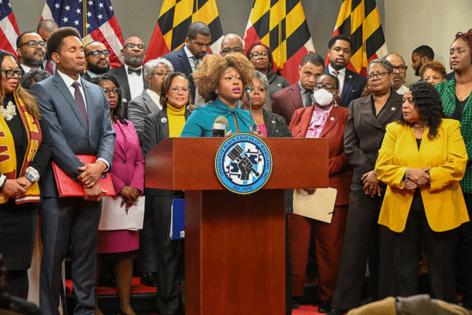Maryland reparations commission gets preliminary approval
Published in News & Features
BALTIMORE — The Maryland House of Delegates gave preliminary approval Tuesday to legislation creating a statewide reparations commission to study and make recommendations on benefits to Marylanders whose ancestors were enslaved or impacted by inequitable government policies.
“Maryland has a long history of racial inequities, from slavery to present-day disparities in wealth, education, housing and health care,” Sen. C. Anthony Muse, a Prince George’s County Democrat sponsoring the measure, said at the bill’s hearing. “The effects of these injustices still shape the lives of many Marylanders today.”
Establishing the Maryland Reparations Commission to address those harms, Muse said, is not just about acknowledging history — it’s about creating a more equitable future.
The bill — a 2025 priority for Maryland’s Legislative Black Caucus — would require the commission to examine reparations payments and benefits offered in the United States by governments, religious institutions, colleges and universities. It would also study the type of benefits appropriate for reparations, which could include official apologies, monetary compensation, property tax rebates, social service assistance, help with down payments, business incentives and child care.
In addition, the commission would be tasked with studying the history of slavery in Maryland, the number of people whose ancestors were enslaved, and how public and private institutions benefited from inequitable government policies.
Any recommendation made by the commission would need to include eligibility requirements, procedures to evaluate and verify potential recipients’ lineage, a process to approve applications seeking benefits and an estimate of the costs associated with awarding recommended reparations.
If monetary compensation is suggested, the commission would have to include the amount recommended and the method of calculating that total, as well as potential funding sources and the feasibility of creating a reparations fund, according to the bill.
While the legislation passed through the Senate in a 32 to 13 vote in mid-March, it has faced more challenges in the opposite chamber. House Republicans offered amendments to the legislation on Tuesday, but they were rejected.
One amendment brought forward by Baltimore County Del. Ryan Nawrocki sought to include people whose ancestors were Union soldiers or fought to end slavery into the conversation on reparations.
“It provides a pathway to thank those folks as well that played a significant role in ending slavery in this country,” he said.
Del. Joseline Peña-Melnyk, a Democrat who represents Prince George’s and Anne Arundel counties, said what Nawrocki was proposing was a different bill, and just because someone was in the Union army does not mean that they suffered injustices described in the bill.
“We have ways of acknowledging their good work, but reparations is not the way to do it,” she said. “This is a different bill for different people — people that lived in this state, the state benefited greatly from having their labor for free, forced, and this is their day.”
While the legislation is on its way to a final vote in the House, when asked, Maryland Gov. Wes Moore did not directly say whether he will sign the measure if passed.
“I have said and long stated that the history of racism in this state is real,” Moore told reporters when asked about the bill during a briefing last week. “And that the challenges that we have seen, that understanding that Maryland is the northernmost Southern state in the country, that some of the bloodiest battles of the Civil War were fought here, that this was the birthplace of red lining, that the impacts of those things are still very much being felt and they’ve been structurally felt within the state of Maryland.”
Asked Tuesday if the governor had additional comments with the bill moving forward in the legislature, Moore spokesman Carter Elliott said the governor “looks forward to continuing to work with the State Legislature, local leaders, and all partners involved to ensure that we are passing legislation that will make Maryland safer, more affordable, more competitive, and the state that serves.”
------------
©2025 The Baltimore Sun. Visit at baltimoresun.com. Distributed by Tribune Content Agency, LLC.







Comments